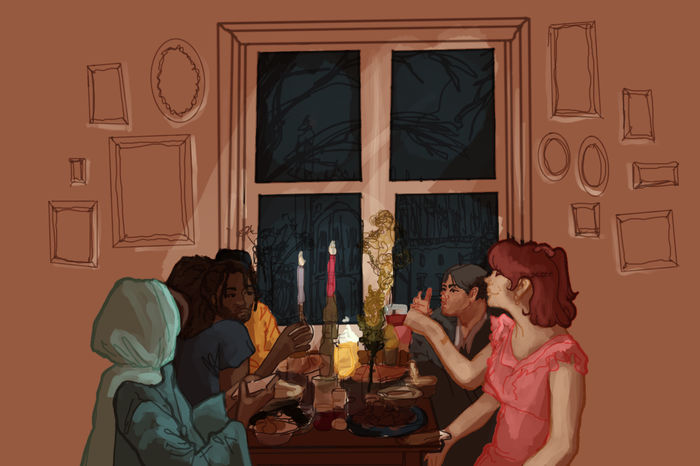Long-distance relationships make Cambridge easier
Being long-distance with your partner at Cambridge allows you to swap feelings of academic pressure with idealism, argues Max La Bouchardiere

In Cambridge, maintaining a long-distance relationship is something of an anomaly – a deviation from the stress-ridden atmosphere encompassing this institution. But contrary to the tired assumption that long-distance relationships won’t last at university, take my experience as assurance (for all you freshers, especially) that they are possible, even at a place like Cambridge. More than that, they make this short interval in our lives so much easier.
It’s not difficult to lose ourselves in a culture of overwork, exams and deadlines. These pressures are put on us externally by supervisors and by ourselves, rooted in a perfectionist trait so customary that speaking of it together with Cambridge feels tautological.
“Across the many miles that should have set us apart, she had already punctured both Cambridge’s and my own pressurised bubble”
Therefore, it’s hardly a surprise that this was my case entering Michaelmas last year. A momentarily starry-eyed fresher, I had been picked up from a nowhere-town in rural Wiltshire and thrown into what seemed a bustling, intense city. It was Day Three of Freshers’ Week, and I, like most other freshers, found myself in Revs. Rather than being captivated by Cambridge’s charmingly lacklustre club scene, I noticed my phone vibrate. I had been confronted with notice of a second essay – due imminently.
Anxious and feeling out of my depth, I left. But on my admittedly short, drunken journey back to King’s College, I was on the phone to my girlfriend explaining what had happened. She was now far away at another university entirely - a partition from our days in sixth form, demarcated by geographical distance and academic commitments.
She told me I was allowed to enjoy freshers’.
Was I? I didn’t have the time for enjoyment. I didn’t need it. Gifted with an offer that nobody else from back home had received, I felt I couldn’t waste it. However, her words resonated, even from afar. Across the many miles that should have set us apart, she had already punctured both Cambridge’s and my own pressurised bubble that I was otherwise bound to envelop myself in.
I don’t fully remember the subsequent evening, so her words must have left a fairly immediate impact. It was that appearance of loving guidance when I needed it most – with a perspective so crucially devoid of any Cambridge quality – which reassured me that our long-distance relationship would work.
That same week I recall telling someone, also entering Cambridge in a long-distance relationship, that my partner and I planned to see each other fortnightly, alternating each train journey and visit. They seemed taken aback, with an insinuation of doubt that this would last. Yet, it did.
Sure, I probably spent half my bursary funding on train tickets (despite a railcard!) over this last year. There were, of course, many instances of last-minute supervision scheduling (to which I would then have to traverse several trains and a tube ride back to Cambridge in the morning, often noticeably hungover). But it was in this balancing act that I learned to love my university.
In a long-distance relationship, I could identify Cambridge’s absurdity: a micro-society of overloaded young adults operating in an institution where we can college marry, May Balls are in June, and everything is abbreviated. Routinely taking time away from this no-longer-seemingly bustling city allowed me to enjoy these idiosyncrasies rather than feel exhausted or trapped by them.
“After each visit, I would return to a denaturalized Cambridge, bifurcated by a more realised need to reclaim certain aspects of this university”
Instead of becoming accustomed to this culture of overwork, I had a loving reminder that I didn’t need to be a perfectionist. We could be reciprocally proud of each other without our only forms of validation being exclusively tied to our respective universities. Rather than feel inattentive to many of Cambridge’s beautiful qualities, I had a reason to explore, tour and look for them.
We met each other’s friends and we both learned more about how different universities functioned: the courses they had to offer, the societies, the people, and the exams. After each visit, I would return to a denaturalized Cambridge, bifurcated by a more realised need to reclaim certain aspects of this university. There was the Cambridge I could love and have renewed excitement for, and the Cambridge I increasingly had an apparatus to criticise.
My perfectionism has dwindled, and my long-distance relationship has undoubtedly made my time here easier. It is now much easier to spot what can be improved, when to take a break, and what can be borrowed from elsewhere. Whether that’s the exams, culture or the overwork, being able to not fall apathetic or burned out has only been made possible thanks to Isobel, and nurturing our long-distance relationship this past year.
 News / Cambridge bus strikes continue into new year16 January 2026
News / Cambridge bus strikes continue into new year16 January 2026 News / Local business in trademark battle with Uni over use of ‘Cambridge’17 January 2026
News / Local business in trademark battle with Uni over use of ‘Cambridge’17 January 2026 Interviews / The Cambridge Cupid: what’s the secret to a great date?14 January 2026
Interviews / The Cambridge Cupid: what’s the secret to a great date?14 January 2026 News / Uni members slam ‘totalitarian’ recommendation to stop vet course 15 January 2026
News / Uni members slam ‘totalitarian’ recommendation to stop vet course 15 January 2026 Science / Why smart students keep failing to quit smoking15 January 2026
Science / Why smart students keep failing to quit smoking15 January 2026










